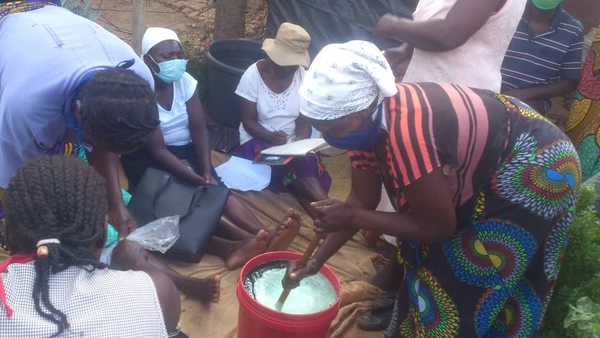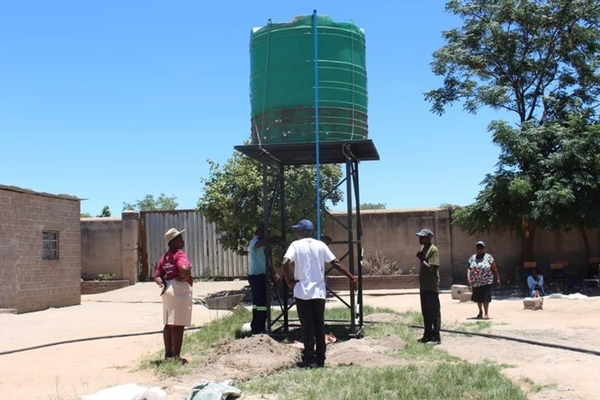- Who We Are
- How We Work
- Regional / Country Initiatives
- Legacy
- Core Themes
- Working Groups
- Portfolio & Results
- Newsroom
- Resources
Zimbabwe: Building Community Resilience in Informal Settlements

Project Overview
Zimbabwe faces deepening economic and social crises, exacerbated by the Covid-19 pandemic and climate-related disasters. Soaring inflation, high unemployment, and food insecurity have left vulnerable communities struggling to survive. The project offers micro-business grants and starter kits for recovery and food security, fosters social cohesion, provides capacity-building programs for marginalized groups, enhances infrastructure, and gathers data for informed decision-making.
Supported by the Dialogue on Shelter for the Homeless Trust, it empowers marginalized communities in 57 informal settlements across 36 cities, primarily through the Zimbabwe Homeless People’s Federation and Zimbabwe Young People’s Federation.
This project is part of the Building Resilience in Informal Settlements Programme, a partnership between Cities Alliance and Slum Dwellers International (SDI), funded by the Swedish International Development Cooperation Agency (Sida), to support civil society organizations working in informal settlements.

Project Results: 2022-2024
The project has made remarkable strides, empowering communities across 61 cities through the establishment of 69 savings groups with 1,241 savers and 1,625 youth members. Within these groups, 413 members have undergone comprehensive training in income generation and livelihood skills, including invaluable lessons in entrepreneurship and horticulture. From crafting detailed business plans to mastering land preparation techniques, pest control strategies, understanding nutritional values, and effective marketing tactics, these individuals are equipped with the tools they need to thrive. 44 learning exchanges benefitted 518 individuals.
24 groups are well trained in savings manual usage and received livelihood starter kits, including detergent making kits, small animal husbandry kits, and sewing kits.
Dialogue on Shelter for the Homeless and the Zimbabwe Homeless People's Federation (ZHPF) mobilised groups for capacity building, and training on understanding federation operations, and monitoring and evaluation. Additionally, 31 young people underwent content creation training.
Training sessions on climate change impact were held, reaching 264 Federation members. An informal design studio was established, resulting in crucial designs and maps for future informal market developments. Additionally, ten water point committee members were trained in solarised borehole system operation, and a solar borehole capacitation project was completed in Bulawayo. 188 people are now able to adapt better to climate change.
The project helped 36 households to improve their tenure and 48 households to improve their housing. 75 households gained access to improved energy.
Four monitoring visits were conducted, recording success stories such as local authority water connections facilitated by federation savings initiatives. Advocacy also included 2 settlement-level and 6 city and national-level campaigns. 5 federation meetings ensured strengthening the federation further. 6 cities and 17 settlements were profiled and 6 settlements were enumerated, supporting ongoing dialogue with authorities.

Worm Power for a Greener Future in Zimbabwe
The Jati Composter project has transformed waste management, sanitation and economic opportunities through an innovative vermi-composting system. The project introduced the Jati Composter, which converts organic waste into high-quality fertiliser using earthworms. This initiative improves sanitation by diverting waste from landfills and reduces methane emissions, contributing to climate change mitigation and soil health. The project has created employment opportunities, with residents generating income by selling worms and organic fertiliser to gardeners and farmers. Many community members also use the fertiliser in their backyard gardens, enhancing food security and self-sufficiency. The project has promoted gender equality; women have played a key role in managing composting facilities, gaining new skills and economic independence.
Beyond its environmental and economic benefits, the project has fostered community ownership and responsibility, encouraging residents to actively contribute to a cleaner, more sustainable future. The success of the Jati Composter project highlights the potential of community-driven solutions to tackle both environmental and socio-economic challenges, demonstrating how sustainable waste management can improve livelihoods, climate resilience and local food systems.
Key Achievements: 2022-2024
- 69 savings groups and 1,241 savers supported
- 1,625 youth members mobilised and supported
- 36 households with improved tenure
- 48 households with improved housing
- 75 households with access to improved energy
- 264 people supported through networking and training to address climate change or to conserve biodiversity
- 188 people supported to better adapt to the effects of climate change
- 6 cities and 17 settlements profiled and 6 settlements enumerated
- 2 settlement level information forums or campaigns
- 6 city or national level advocacy campaigns conducted
- 31 content creating initiatives involving youth
- 5 regional or national level federation leadership meetings were held
- 44 peer-to-peer learning exchanges with 518 individuals
